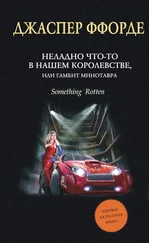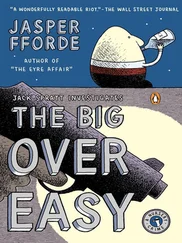“What did you see?” asked Bradshaw.
“Nothing. I must have . . . dreamt it. I’m very sorry to have wasted your time, sir.”
He looked at me for a long while, trying to divine what, if anything, I knew. Finally he said, “You are keeping the Thursday Next series dignified, I trust?”
“Yes, sir—even at the expense of readability.”
“Being read isn’t everything. Some of the best people are hardly read at all. Listen,” he said thoughtfully, staring at me with his intelligent blue eyes, “would you do something for me?”
“Of course.”
Right then a man draped in the white linen robes of the most senior senatorial office walked briskly through the front doors of Norland Park and into the entrance hall in which we stood.
“Oh, crap,” said Bradshaw under his breath. “Just what we need: Jobsworth.”
If he was over here in person, it would be for a very good reason—probably about the Racy Novel peace talks.
I thought of dropping to one knee and averting my eyes as the frog-footman had done, but for some reason I didn’t. The Thursday part of me, I suppose. Jobsworth was not alone. As well as the usual phalanx of staff, hangers-on and deputies, there was Barnes, Jobsworth’s executive assistant; Colonel Barksdale, the head of the Avoiding War Department; and Commander Herring, who was busy reading a report and hadn’t yet seen me.
“Good morning, Bradshaw,” said Jobsworth. Bradshaw wished the senator good morning, then the same to Commander Herring and Colonel Barksdale. Barnes was too far down the pecking order to be greeted, as were all the other members of Jobsworth’s staff. The senator began to speak, then saw me. His eyes opened wide.
“Great Panjandrum!” he said. “Thursday?”
Bradshaw looked at me, then at the senator. I opened my mouth to reply, but Bradshaw held up a hand. In such company it was strictly speak-when-spoken-to. Protocol in the BookWorld was like grammatical rules—rigidly structured, arcane and fiercely defended by librarians wielding wooden rulers with painful accuracy.
“No, Senator, it’s the written version.”
“Truthfully?” asked Jobsworth. “She looks an awful lot like her.”
“If she were the real one, do you think she would be here accompanied by that . . . that—what’s your name?”
The frog-footman looked startled at being spoken to. “Wesley,” he said in a quiet voice.
“Right,” said Bradshaw, not really listening, “ being shown around by frog guy? If this were the one, she’d be in the office discussing the peace talks and the metaphor crisis.”
“I’ll vouch that she’s the written one,” said Herring, who had just looked up. “Are you here on JAID business, Next?”
“I am, sir.”
“Then you can take your findings direct to Lockheed.”
It seemed a good moment to leave, so I bobbed politely and began to withdraw.
“Wait,” said the senator. “Bradshaw, why were you speaking to her if she’s just the copy?”
For a fleeting moment, Bradshaw looked uncomfortable.
“I was asking her if . . . she could ask Lorina Peabody to head up the Talking Animal Division of Jurisfiction.”
“Who the hell’s Lorina Peabody?”
“She’s a dodo,” I said.
Jobsworth stared at Bradshaw suspiciously, then me. “Introduce us,” he said after a pause.
“Very well,” said Bradshaw with a sigh. “Senior Senator Giles Jobsworth, head of Fiction and emissary to the Great Panjandrum, the written Thursday Next.”
“Hello,” he said, shaking me by the hand and giving me the smile of somebody who was considering how best one could be exploited.
“Honored, Senator, sir,” I replied dutifully.
Jobsworth was perhaps sixty or sixty-five, graying at the temples and with the look of someone weighed down heavily by responsibility. He stepped forward and put a finger under my chin. I should have been more overawed in his presence, but I wasn’t. In fact, I had every reason to dislike him. When the senior senator was merely a senator, he had blocked my series from having Landen in it. He had said having no Landen was “as the author intended,” but that didn’t really help, to be honest.
“It looks exactly like her,” he breathed.
“Like two goddamn peas in a pod,” agreed Bradshaw’s companion.
“I’m mirrored with her, Senator,” I explained. “The books were built using H-29 biographical architecture before they were moved to Nonfiction, so my looks are directly linked to hers. I age at the same rate and even grow the same scars in sympath—”
“Fascinating. Does it have skills and an intellect to match, Commander Bradshaw?”
“It does not—nor any dress sense. What’s your interest in an A-8 copy of Thursday Next, Senator?”
“The interests of the council are not necessarily the interests of Jurisfiction, Bradshaw.”
They stared at each other for several seconds. I expect this happened quite a lot. Jurisfiction was a policing agency, working under the council, who were wholly political. I can’t imagine they ever got on.
“Sir?” said Barnes, gently coaxing the senator to stick to his schedule. “You have a meeting.”
“Very well,” said the head of Fiction, and he strode off into the Jurisfiction offices with Herring, Barksdale and his entourage. Bradshaw stared at me for a moment, then told me I was excused. I needed no further bidding, and curtsied politely before hurrying off with the frog-footman.
“Well, thanks for that,” said the frog-footman sarcastically. “You just ruined my six-year ‘being ignored by Commander Bradshaw’ record.”
“He didn’t remember your name,” I said, trying to be helpful, “and was horribly insensitive when he called you ‘frog guy.’”
“Well, okay,” said the frog-footman, “that does take the sting out a little bit. But tell me,” he said, staring at me with his large, protruding eyes and broad mouth, “why did he call me ‘frog guy’?”
“I was up for Jurisfiction once,” I said, quickly changing the subject, “but it didn’t work out.”
“Me, too,” sadly replied the frog-footman, whose mind didn’t seem to pause on any one subject for long. “I didn’t make it past the ‘What is your name?’ question. You?”
“Training day. Froze when the going got tough. Nearly got my mentor killed.”
“To fail spectacularly is a loser’s paradise,” said the frog-footman wistfully. “This way.”
Distilling metaphor out of raw euphemism was wasteful and expensive, and the euphemism-producing genres on the island were always squeezing the market. Besides, the by-product of metaphor using the Cracked Euphemism Process liberates irony-238 and dangerous quantities of alliteration, which are associated with downright dangerous disposal difficulties.
Bradshaw’s BookWorld Companion (9th edition)
We walked down the seemingly endless corridors, every door placarded with the name of the department contained within. One was labeled OLD JOKES and another NOUN-TO-VERB CONVERSION UNIT. Just past the offices of the Synonym Squad and the Danvers Union headquarters was a small office simply labeled JAID.
“Right. Well,” I said, “I’ll see myself out when I’m done.”
“I’m afraid not,” replied the frog-footman. “I am instructed to escort you both in and out.”
So while the frog-footman sat on a chair in the corridor opposite, I knocked on the door.
“Commander Herring told me you would be stopping by,” said Lockheed as I entered. “Do come in. Tea?”
“No thank you.”
Читать дальше











![Джаспер Ффорде - Вечный кролик [litres]](/books/436518/dzhasper-fforde-vechnyj-krolik-litres-thumb.webp)
